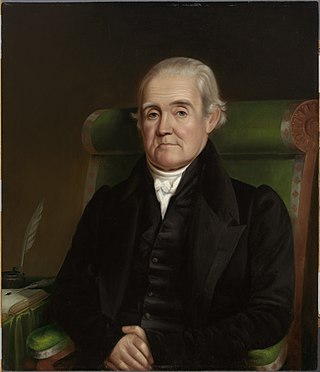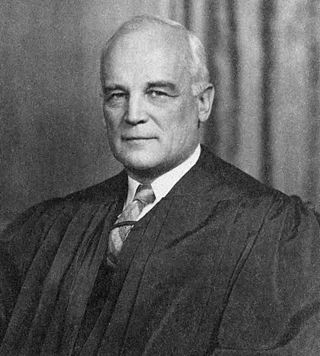Related Research Articles

Noah Webster Jr. was an American lexicographer, textbook pioneer, English-language spelling reformer, political writer, editor, and author. He has been called the "Father of American Scholarship and Education". His "Blue-backed Speller" books taught five generations of American children how to spell and read. Webster's name has become synonymous with "dictionary" in the United States, especially the modern Merriam-Webster dictionary that was first published in 1828 as An American Dictionary of the English Language.
Webster's Dictionary is any of the English language dictionaries edited in the early 19th century by Noah Webster (1758–1843), an American lexicographer, as well as numerous related or unrelated dictionaries that have adopted the Webster's name in his honor. "Webster's" has since become a genericized trademark in the United States for English dictionaries, and is widely used in dictionary titles.

Horace Mann was an American educational reformer, slavery abolitionist and Whig politician known for his commitment to promoting public education, he is thus also known as the The Father of American Education. In 1848, after public service as Secretary of the Massachusetts State Board of Education, Mann was elected to the United States House of Representatives (1848–1853). From September 1852 to his death, he served as President of Antioch College.

An abecedarium is an inscription consisting of the letters of an alphabet, almost always listed in order. Typically, abecedaria are practice exercises.

A desk or bureau is a piece of furniture with a flat table-style work surface used in a school, office, home or the like for academic, professional or domestic activities such as reading, writing, or using equipment such as a computer. Desks often have one or more drawers, compartments, or pigeonholes to store items such as office supplies and papers. Desks are usually made of wood or metal, although materials such as glass are sometimes seen.

Harold Hitz Burton was an American politician and lawyer. He served as the 45th mayor of Cleveland, Ohio, as a U.S. Senator from Ohio, and as an associate justice of the Supreme Court of the United States.

Joseph Emerson Worcester was an American lexicographer who was the chief competitor to Noah Webster of Webster's Dictionary in the mid-nineteenth-century. Their rivalry became known as the "dictionary wars". Worcester's dictionaries focused on traditional pronunciation and spelling, unlike Noah Webster's attempts to Americanize words. Worcester was respected by American writers and his dictionary maintained a strong hold on the American marketplace until a later, posthumous version of Webster's book appeared in 1864. After Worcester's death in 1865, their war ended.
Abecedarians were a 16th-century German sect of Anabaptists who rejected all human learning. Questions have been raised as to the historical accuracy of the name and sect, though the term was applied broadly to the Zwickau Prophets.

Webster's New World Dictionary of the American Language is an American dictionary first published in 1951 and since 2022 published by Harper Collins Publishers.

Levi Lincoln Jr. was an American lawyer and politician from Worcester, Massachusetts. He was the 13th Governor of Massachusetts (1825–1834) and represented the state in the U.S. Congress (1834–1841). Lincoln's nine-year tenure as governor is the longest consecutive service in state history; only Michael Dukakis, John Hancock and Caleb Strong served more years, but they were not consecutive.
For centuries, there have been movements to reform the spelling of the English language. It seeks to change English orthography so that it is more consistent, matches pronunciation better, and follows the alphabetic principle. Common motives for spelling reform include quicker learning, cheaper learning, and making English more useful as an international auxiliary language.

Johann Bernhard Basedow was a German educational reformer, teacher and writer. He founded the Philanthropinum, a short-lived but influential progressive school in Dessau, and was the author of "Elementarwerk", a popular illustrated textbook for children.
A common school was a public school in the United States during the 19th century. Horace Mann (1796–1859) was a strong advocate for public education and the common school. In 1837, the state of Massachusetts appointed Mann as the first secretary of the State Board of Education where he began a revival of common school education, the effects of which extended throughout America during the 19th century.

Webster's Third New International Dictionary of the English Language, Unabridged was published in September 1961. It was edited by Philip Babcock Gove and a team of lexicographers who spent 757 editor-years and $3.5 million. The most recent printing has 2,816 pages, and as of 2005, it contained more than 476,000 vocabulary entries, 500,000 definitions, 140,000 etymologies, 200,000 verbal illustrations, 350,000 example sentences, 3,000 pictorial illustrations and an 18,000-word Addenda section.
A pronunciation respelling for English is a notation used to convey the pronunciation of words in the English language, which do not have a phonemic orthography.
An abecedarius is a special type of acrostic in which the first letter of every word, strophe or verse follows the order of the letters in the alphabet.

William Andrus Alcott, also known as William Alexander Alcott, was an American educator, educational reformer, physician, vegetarian and author of 108 books. His works, which include a wide range of topics including educational reform, physical education, school house design, family life, and diet, are still widely cited today.
Abecedarian is a 16th-century German sect that rejected any education above the minimal level.
The Devil and Daniel Webster is a folk opera in one act by American composer Douglas Moore. The opera's English-language libretto was written by Stephen Vincent Benét who also penned the 1936 short story of the same name upon which the work is based. Composed from 1937 through 1939, it premiered on Broadway at the Martin Beck Theatre on 18 May 1939. The first opera by Moore to achieve wide success, it has remained a part of the opera repertory. Containing spoken words as well as sung material, Martin Bookspan stated that "the opera is really a 20th-century American singspiel, with extensive stretches of dialogue alternating with the musical numbers." The opera is set in 1840s New Hampshire within the fictional town of Cross Corners. Described as an "American Faust" for its similarities to the German tale with an American milieu, the opera tells the story of the farmer Jabez Stone who sells his soul to the devil. When the devil comes to collect his soul he is thwarted by the statesman Daniel Webster whose clever tongue outmaneuvers him.
References
- ↑ Brewer, E. Cobham (1978) [1894]. The Dictionary of Phrase and Fable. reprint. Edwinstowe, England: Avenel Books. p. 3. ISBN 0-517-25921-4.
- 1 2 Burton, Warren (1838). The District School As It Was, By One Who Went To It. New York: J. Orville Taylor. pp. 5.
warren burton.
- ↑ Sammons, Mark (1985). "Myths and Methods: the District School in Early 19th-Century New England". Old Sturbridge Village.
- ↑ Webster, Noah (1838). A Dictionary for Primary Schools. New York: F.J. Huntington. pp. 7.
noah webster dictionary.
- ↑ Fennelly, Caroline (1962). Town Schooling in Early New England, 1790-1840. Sturbridge, MA: Old Sturbridge Village. p. 17.
- ↑ Goodrich, Samuel Griswold (1857). Recollections of a Lifetime. New York: Miller, Orton & Company. pp. 140.
abc-darians.
- ↑ Mowry, William Augustus (1908). Recollections of a New England Educator, 1838-1908. New York, Boston & Chicago: Silver, Burdett & Company. pp. 16.
a-b-c-darians.
- ↑ Barnard, Henry (1863). "A-B-C Books and Primers". American Journal of Education. Hartford: Henry Barnard. XII: 597.
- ↑ Phelps, W.F. (1851). "Lecture before the N. Y. State Teachers Association, in Hope Chapel, Broadway, August 8th, 1850". The District School Journal of the State of New York. Albany: Weed, Parsons & Company. 11: 106.
- ↑ Twenty-Second Annual Report. New York (N.Y.). Board of Education. 1864. pp. 101–102.
- ↑ Howland, George (1898). Practical Hints For The Teachers Of Public Schools. New York: D. Appleton & Company. pp. 26.
abc-darians.